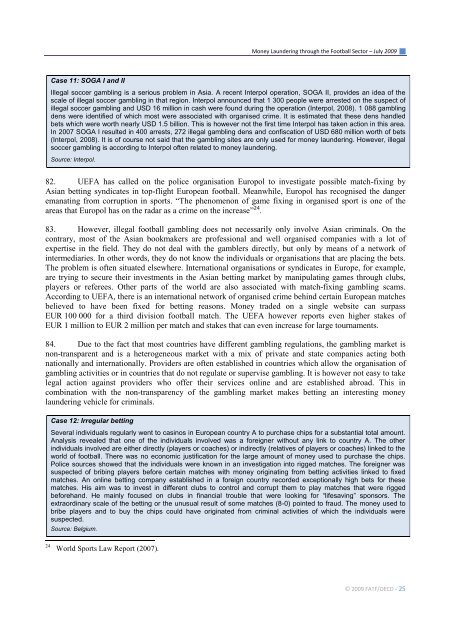Money Laundering through the Football Sector
Money Laundering through the Football Sector
Money Laundering through the Football Sector
You also want an ePaper? Increase the reach of your titles
YUMPU automatically turns print PDFs into web optimized ePapers that Google loves.
Case 11: SOGA I and II<br />
<strong>Money</strong> <strong>Laundering</strong> <strong>through</strong> <strong>the</strong> <strong>Football</strong> <strong>Sector</strong> – July 2009 <br />
Illegal soccer gambling is a serious problem in Asia. A recent Interpol operation, SOGA II, provides an idea of <strong>the</strong><br />
scale of illegal soccer gambling in that region. Interpol announced that 1 300 people were arrested on <strong>the</strong> suspect of<br />
illegal soccer gambling and USD 16 million in cash were found during <strong>the</strong> operation (Interpol, 2008). 1 088 gambling<br />
dens were identified of which most were associated with organised crime. It is estimated that <strong>the</strong>se dens handled<br />
bets which were worth nearly USD 1.5 billion. This is however not <strong>the</strong> first time Interpol has taken action in this area.<br />
In 2007 SOGA I resulted in 400 arrests, 272 illegal gambling dens and confiscation of USD 680 million worth of bets<br />
(Interpol, 2008). It is of course not said that <strong>the</strong> gambling sites are only used for money laundering. However, illegal<br />
soccer gambling is according to Interpol often related to money laundering.<br />
Source: Interpol.<br />
82. UEFA has called on <strong>the</strong> police organisation Europol to investigate possible match-fixing by<br />
Asian betting syndicates in top-flight European football. Meanwhile, Europol has recognised <strong>the</strong> danger<br />
emanating from corruption in sports. “The phenomenon of game fixing in organised sport is one of <strong>the</strong><br />
areas that Europol has on <strong>the</strong> radar as a crime on <strong>the</strong> increase” 24 .<br />
83. However, illegal football gambling does not necessarily only involve Asian criminals. On <strong>the</strong><br />
contrary, most of <strong>the</strong> Asian bookmakers are professional and well organised companies with a lot of<br />
expertise in <strong>the</strong> field. They do not deal with <strong>the</strong> gamblers directly, but only by means of a network of<br />
intermediaries. In o<strong>the</strong>r words, <strong>the</strong>y do not know <strong>the</strong> individuals or organisations that are placing <strong>the</strong> bets.<br />
The problem is often situated elsewhere. International organisations or syndicates in Europe, for example,<br />
are trying to secure <strong>the</strong>ir investments in <strong>the</strong> Asian betting market by manipulating games <strong>through</strong> clubs,<br />
players or referees. O<strong>the</strong>r parts of <strong>the</strong> world are also associated with match-fixing gambling scams.<br />
According to UEFA, <strong>the</strong>re is an international network of organised crime behind certain European matches<br />
believed to have been fixed for betting reasons. <strong>Money</strong> traded on a single website can surpass<br />
EUR 100 000 for a third division football match. The UEFA however reports even higher stakes of<br />
EUR 1 million to EUR 2 million per match and stakes that can even increase for large tournaments.<br />
84. Due to <strong>the</strong> fact that most countries have different gambling regulations, <strong>the</strong> gambling market is<br />
non-transparent and is a heterogeneous market with a mix of private and state companies acting both<br />
nationally and internationally. Providers are often established in countries which allow <strong>the</strong> organisation of<br />
gambling activities or in countries that do not regulate or supervise gambling. It is however not easy to take<br />
legal action against providers who offer <strong>the</strong>ir services online and are established abroad. This in<br />
combination with <strong>the</strong> non-transparency of <strong>the</strong> gambling market makes betting an interesting money<br />
laundering vehicle for criminals.<br />
Case 12: Irregular betting<br />
Several individuals regularly went to casinos in European country A to purchase chips for a substantial total amount.<br />
Analysis revealed that one of <strong>the</strong> individuals involved was a foreigner without any link to country A. The o<strong>the</strong>r<br />
individuals involved are ei<strong>the</strong>r directly (players or coaches) or indirectly (relatives of players or coaches) linked to <strong>the</strong><br />
world of football. There was no economic justification for <strong>the</strong> large amount of money used to purchase <strong>the</strong> chips.<br />
Police sources showed that <strong>the</strong> individuals were known in an investigation into rigged matches. The foreigner was<br />
suspected of bribing players before certain matches with money originating from betting activities linked to fixed<br />
matches. An online betting company established in a foreign country recorded exceptionally high bets for <strong>the</strong>se<br />
matches. His aim was to invest in different clubs to control and corrupt <strong>the</strong>m to play matches that were rigged<br />
beforehand. He mainly focused on clubs in financial trouble that were looking for “lifesaving” sponsors. The<br />
extraordinary scale of <strong>the</strong> betting or <strong>the</strong> unusual result of some matches (8-0) pointed to fraud. The money used to<br />
bribe players and to buy <strong>the</strong> chips could have originated from criminal activities of which <strong>the</strong> individuals were<br />
suspected.<br />
Source: Belgium.<br />
24 World Sports Law Report (2007).<br />
© 2009 FATF/OECD - 25


